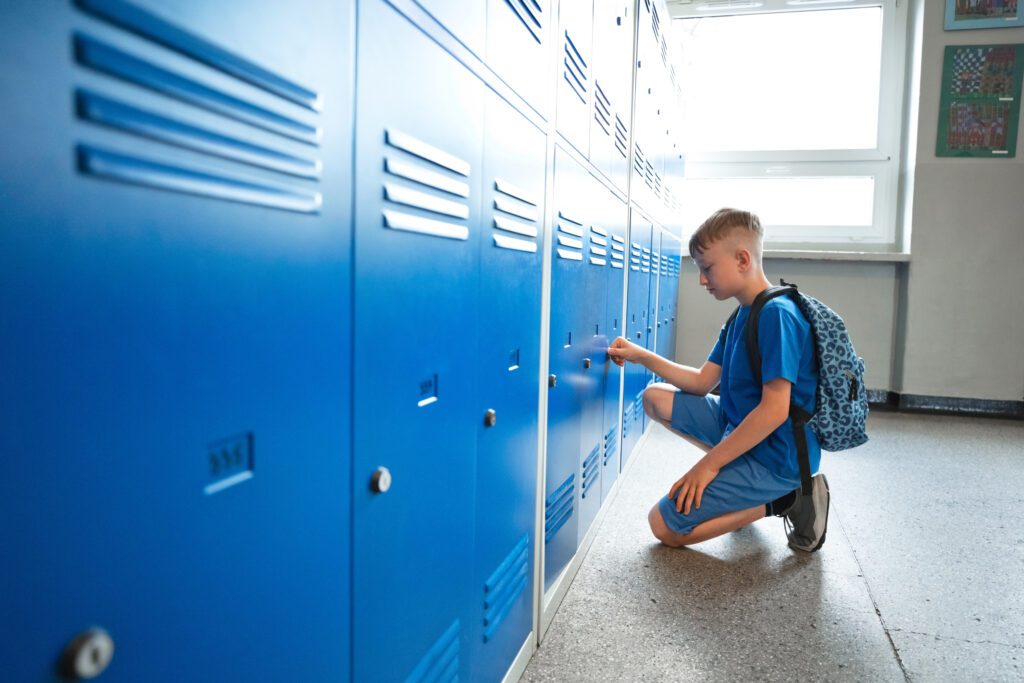Leveling Up: Get Ready for the Next Stage of School
When kids are transitioning between elementary, middle or high school, parents must not only prep their child for the changes, but also absorb piles of new information themselves. Here’s what you need to know to stay strong at every stage.
Elementary School
Get involved: Elementary school is an excellent time to plug in to parent involvement opportunities. Attend the school’s first parent-teacher organization meeting — you’ll learn about events and activities that can enhance your child’s school experience.
Undercover volunteer: Parental involvement in school is linked to better grades, fewer behavior problems, and increased teacher job satisfaction. Working parents, those with small children at home, and those who can’t spare an entire day for a school field trip can still contribute. Contact your child’s teacher and ask how you can help. Parents can help sort box tops, organize student folders or prep supplies for classroom art projects from home on the weekends. And don’t forget: Music teachers, PE teachers and librarians need help, too.
Work at home: For kindergarten and first grade students, homework loads will likely be light. For very young students, basic reading and math facts are things families can practice at home; ask your teacher for a list of “sight words,” or words your child will need to know on sight by the end of kindergarten and review them weekly with your child. It’s also a great time to plan ahead for upper elementary grades, when homework begins in earnest. Designate a spot for school papers and a calendar where you and your child can keep track of assignments and due dates.
Sleep scene: Experts say today’s children get less sleep than they did a generation ago, and sleep deprivation can bring on ADHD-like symptoms including inattentiveness, mood swings and academic difficulty. Students ages 5 through 7 may still need up to 12 hours of sleep per night; kids age 8 and older may still require 8-10 hours.
Tech talk: Expect students to encounter technology early, even in kindergarten. Many classrooms have “smart boards” — the digital equivalent of a chalkboard — and students begin learning keyboarding skills in kindergarten. Since the pandemic, many schools have adopted a 1:1 ratio of devices to children whether that means laptops or tablets. (Many schools employ firewalls to block inappropriate internet content on these devices while kids are at school.)
Middle School
Supply crunch: Parents of middle schoolers can expect to spend big on school supplies. Costs are edging up because cash-strapped schools are leaning on parents to pick up the tab. Parents also foot the bill for extracurricular activities like band and school sports in middle school. To minimize supply costs, scour ad circulars for big-box stores’ sales, go in with a group of parents and buy bulk supplies and hit garage sales, where finds like backpacks can be snapped up on the cheap.
Schedule swap: Middle school marks a significant academic transition — instead of staying in one classroom, most students move from class to class and interact with a number of teachers throughout the day. Prepare students by purchasing locker-organization supplies — without a classroom “home base,” the locker becomes central to staying organized — and creating a contact list for teacher names, emails and phone numbers. Try to meet teachers face-to-face prior to the first day, which can help ease back-to-school nerves for everyone.
Building skills: Academic pressure dials up in middle school, and students bear more responsibly for meeting deadlines and working independently. Students may need some help upgrading their study skills, such as learning how to use a planner efficiently, keeping track of papers and estimating how long an assignment will take.
Adviser advice: Middle school’s myriad of teachers can seem daunting to parents, who may not know where to turn with questions or concerns. Generally, you can start with your student’s adviser or homeroom teacher, who will be central to his academic team in middle school. Keep this teacher’s name and contact information handy so you can communicate.
Strong failings: In middle school, parents should begin allowing students to experience the natural results of their academic and social choices — this builds the autonomy needed for high school and beyond. If a student forgets to study for an exam or receives a low grade, encourage self-reflection: Did he study as much as possible, understand the material and ask the teacher for help? This analysis can help the student change how he prepares in the future.
High School
Making the grade: Grades hold more significance in high school, where your child’s academic choices can help chart the course for his college future. Expect high school to be more academically rigorous and pay attention to signs your child is falling behind: skipping class, failing to make up late work. Engaging a tutor early on can head off difficulty later.
Teacher talk: Parent-teacher communication shifts in upper grades — expect to hear less from your child’s instructors in general. In high school, students are expected to communicate directly with teachers, in preparation for college. Parents with questions or concerns should speak up — teachers welcome parent contact.
Step into sports: Whether your child shines on the basketball court or prefers solo athletic pursuits, high school is a great time to participate in sports. The most popular school sports by participation level are football, basketball and track and field. School sports are linked to better grades and lower rates of teen pregnancy, as well as providing a boost to college applications.
Calendar crunch: Parents of high schoolers often have questions about college application timelines, and counselors are the main source for answers. Freshman and sophomores should concentrate on challenging themselves academically and getting involved in extracurricular activities; juniors should develop a list of prospective schools, make campus visits and take SAT/ACT tests. Fall of senior year is when most applications go out.
Step up: Children still need parental guidance and support as they learn to manage their academic, social and personal lives. It is still important for parents to be involved in their child’s school life, by knowing his teachers and friends and attending school events.
-Malia Jacobson








